Why should the summer months have all the fun? Winter is also a time for celebration around the world. Here is a look at some of the different winter holidays around the world.
Table of Contents[Hide][Show]
The Most Popular Winter Holidays
From the bright lights of Diwali to the traditional foods of Kwanzaa, there is a variety of holidays that take place during the winter months. Here are some unique winter holidays from around the world:
Three Kings Day (Spain)
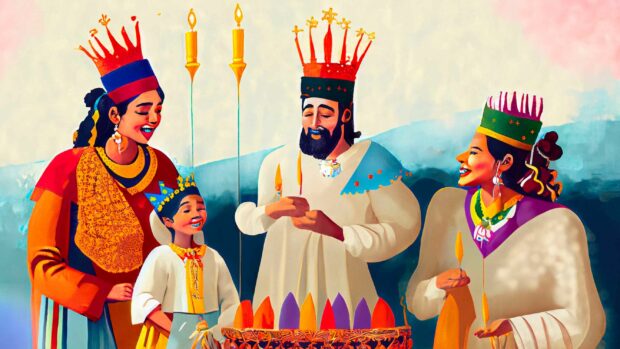
Three Kings Day, January 6, celebrates the visit of the Magi to baby Jesus. Children leave their shoes by the fireplace for presents.
Three Kings Day, or El Día de los Reyes Magos, is celebrated on January 6th. It is the day that the Three Kings are said to have visited the baby Jesus. On this day, children leave their shoes by the fireplace in hopes that the Three Kings will fill them with presents.
Mardi Gras / Pancake Day (United States)
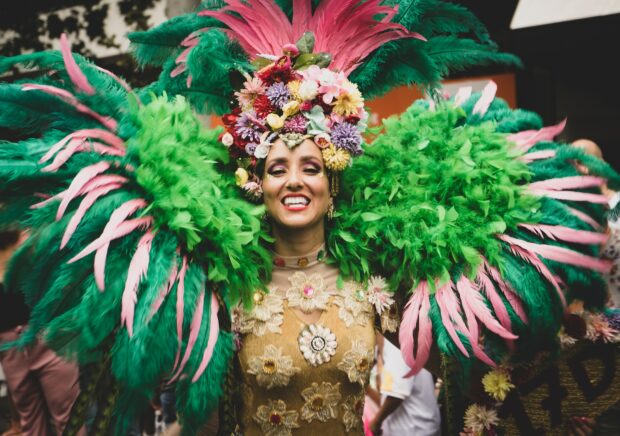
Mardi Gras, the day before Lent, is celebrated with food, drink, parades, & costumes. It’s a time to let loose & have fun.
Mardi Gras, also known as Fat Tuesday, is the day before the start of Lent. Lent is a 40-day period of fasting and repentance in the Christian tradition. During Mardi Gras, people celebrate by eating rich foods, drinking alcohol, and wearing costumes.
In New Orleans, Mardi Gras is a huge event. People celebrate by attending parades, wearing costumes, and throwing beads. The parades are organized by krewes, which are social clubs that often have elaborate floats and costumes.
Mardi Gras is also celebrated in other parts of the world, including Brazil, France, and Italy. In Brazil, Mardi Gras is known as Carnaval and is a major tourist attraction. The Carnaval celebrations in Rio de Janeiro are particularly famous.
In England, Mardi Gras is sometimes known as Pancake Day. On this day, people traditionally eat pancakes as a way of using up all the rich foods in their homes before the start of Lent. In some towns, there are pancake races in which women race while flipping pancakes.
Mardi Gras is a time to let loose and have fun before the start of Lent. It is a time to eat, drink, and be merry.
Kwanzaa (United States)
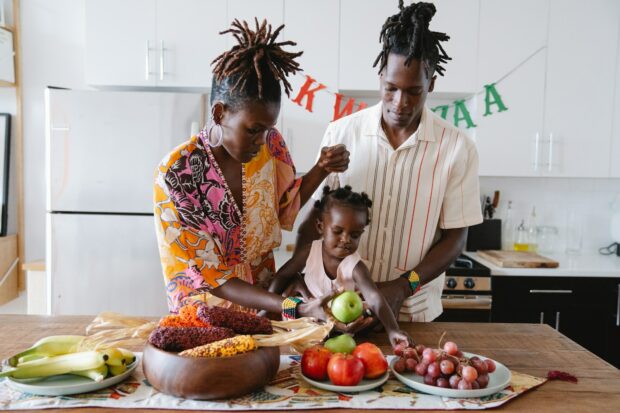
Kwanzaa is a holiday that celebrates African heritage and culture. It is celebrated from December 26th to January 1st.
Kwanzaa is a week-long holiday celebrated by African Americans to honor African heritage and culture. Each day of Kwanzaa focuses on one of the seven principles, or Nguzo Saba, which are:
- Umoja (unity)
- Kujichagulia (self-determination)
- Ujima (collective work and responsibility)
- Ujamaa (cooperative economics)
- Nia (purpose)
- Kuumba (creativity)
- Imani (faith)
Kwanzaa is celebrated by lighting candles, singing songs, feasting on traditional foods, and spending time with family and friends. It is a time to reflect on the past, celebrate the present, and look forward to the future.
Winter Solstice (Northern Hemisphere)
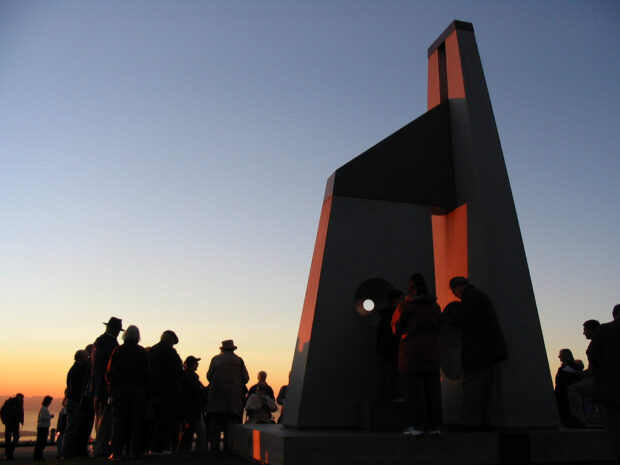
Winter Solstice is the shortest day of the year in the Northern Hemisphere. It is celebrated on December 21st or 22nd.
The winter solstice is the shortest day of the year in the Northern Hemisphere. It occurs on December 21 or 22, and marks the beginning of the astronomical winter.
People celebrate the winter solstice in many different ways. Some gather around fires, sing songs, and tell stories. Others enjoy winter sports such as skiing and snowboarding. Still others simply enjoy spending time with family and friends.
No matter how you choose to celebrate, the winter solstice is a special time of year. It is a time to reflect on the darkness of the past year and to look forward to the light of the coming year. It is also a time to give thanks for the warmth and love of family and friends.
Diwali (India)
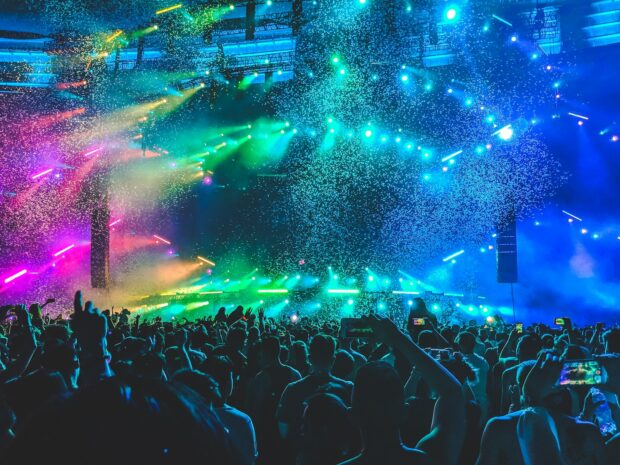
Diwali is a Hindu festival of lights that celebrates the victory of good over evil. It is celebrated in November or December.
Diwali, also known as the Festival of Lights, is a five-day Hindu festival of lights. It is a time to celebrate the victory of good over evil, light over darkness, and knowledge over ignorance. People celebrate Diwali by lighting diyas (small lamps), exchanging gifts, and feasting on delicious food.
Hanukkah (Israel)
Hanukkah is an eight-day Jewish holiday that commemorates the rededication of the Second Temple in Jerusalem. It is celebrated in December or January.
Hanukkah is an eight-day Jewish holiday that commemorates the rededication of the Second Temple in Jerusalem. It is a time to celebrate the miracle of the oil that lasted for eight days even though there was only enough for one day. Hanukkah is celebrated by lighting the menorah, playing dreidel, and eating traditional foods such as latkes and doughnuts.
Chinese New Year (China)
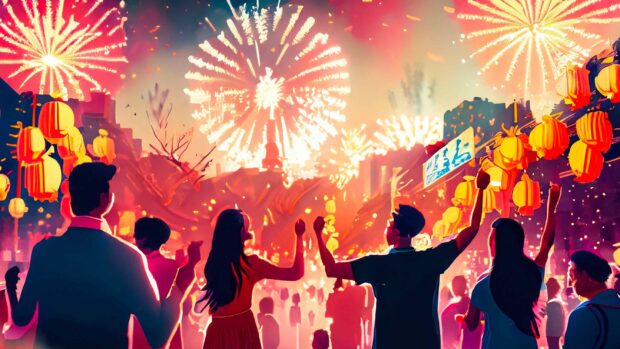
Chinese New Year is a 15-day holiday that celebrates the new year in the lunar calendar. It’s a time for family, food, lion dances, and fireworks.
The Chinese New Year is a 15-day holiday that celebrates the beginning of the new year in the Chinese lunar calendar. It is a time to celebrate with family and friends, eat delicious food, and participate in traditional activities such as lion dances and fireworks.
Maslenitsa (Russia)
Maslenitsa is a week-long festival that celebrates the end of winter and the beginning of spring. It is a time to eat pancakes, drink vodka, and have fun. People celebrate Maslenitsa by building bonfires, riding sleighs, and singing songs.
Maslenitsa is a Slavic holiday celebrated during the last week before Great Lent. It is a time for feasting, fun, and celebration. The holiday is characterized by its traditional foods, such as bliny (pancakes) and syrniki (cheese pancakes), and its festive activities, such as sleigh rides, games, and dancing.
The date of Maslenitsa changes every year, depending on the date of Easter. It corresponds to the Western Christian Carnival, except that Orthodox Lent begins on a Monday instead of a Wednesday.
During the Maslenitsa celebration, it’s common to have traditional symbols like the Maslenitsa effigy, which is a straw doll symbolizing winter. The festival concludes with the burning of the effigy on the last day, bringing a perfect end to an exciting holiday.
Maslenitsa is a time for people to come together and celebrate the end of winter and the beginning of spring. It is a time for feasting, fun, and celebration.
St. Lucia Day (Sweden)
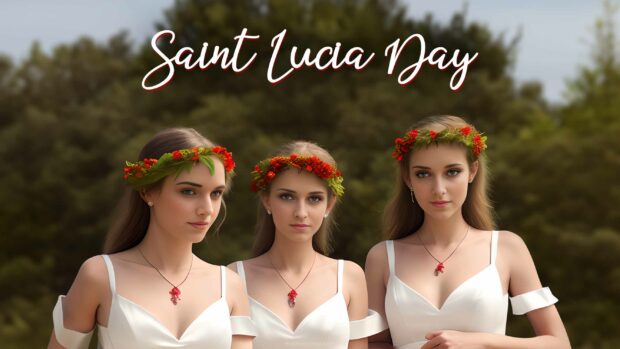
Saint Lucia Day is a Christian feast day celebrated on December 13. It commemorates Lucia of Syracuse, a young Christian martyr who was killed in the 4th century. Lucia is known for her charity and her willingness to help others, even in the face of persecution.
On December 13, Sweden celebrates St. Lucia Day. To honor this third-century saint, young women dress up as “Lucia brides” in long white gowns with red sashes and a wreath of burning candles on their heads. They wake up their families by singing traditional songs and bringing them coffee and lussekatter, which are sweet saffron buns.
The tradition of celebrating St. Lucia Day dates back to the 17th century. St. Lucia was a young Christian woman who was martyred in Sicily in the third century. She is said to have brought food and aid to Christians who were being persecuted by the Roman Empire. In Sweden, St. Lucia is seen as a symbol of light and hope during the dark winter months.
The St. Lucia Day celebration is a special time for families to come together and celebrate their Swedish heritage. It is also a time to reflect on the importance of light and hope in the world.
If you are ever in Sweden during the winter, be sure to experience the St. Lucia Day celebration. It is a beautiful and heartwarming tradition that is sure to bring you joy.
Feast of Saint Nicholas (Netherlands)
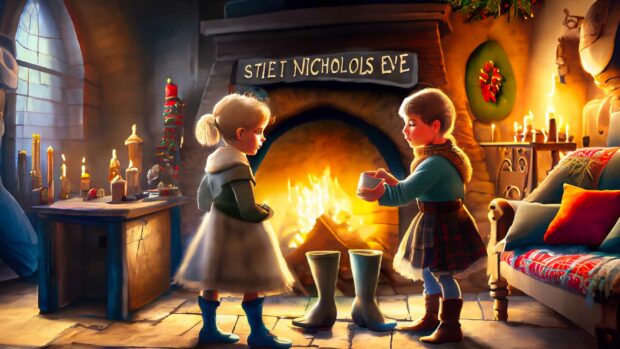
St. Nicholas Eve is the night before Saint Nicholas Day. The Christian holiday is celebrated on December 5 or 6 in Western Christian countries, and on December 19 in Eastern Christian countries. It is a holiday to celebrate the life of Saint Nicholas, a fourth-century bishop who was known for his generosity and kindness.
St. Nicholas Eve, or Sinterklaasavond, is celebrated on the eve of the feast day of Saint Nicholas, the patron saint of children. On this night, children leave their shoes by the fireplace in hopes that Saint Nicholas will fill them with candy and other treats. Many popular Christmas traditions have connections to St. Nicholas Eve.
Christmas (Global)
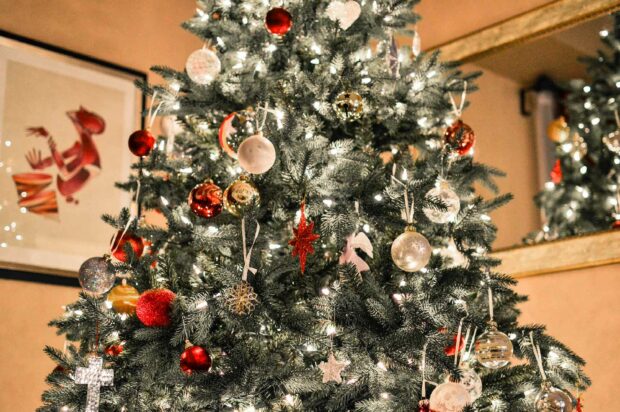
Christmas is one of the most famous winter holidays. The popular Christian holiday celebrates the birth of Jesus Christ. It is celebrated on December 25th in most countries.
Christmas is a Christian holiday that is celebrated around the world. People celebrate Christmas by going to church, giving gifts, and spending time with their families. In some parts of Europe, “star singers” go caroling, which is singing Christmas songs while walking behind a large star on a pole.
Christmas celebrations in Ireland tend to be more religious in nature than gift-giving. Christmas celebrations in Ireland last from Christmas Eve until January 6th (Epiphany). On December 26th, also known as St. Stephen’s Day or Boxing Day, an Irish tradition called the Wren Boys Procession takes place. Children go door-to-door singing while holding a stick topped with a holly bush and a wren. They ask for money for the “starving wren”, which they put into their pockets. In ancient times, a real wren was killed and fastened to the stick, but today fake wrens are used.
In Ukraine, Christmas Eve festivities are called Sviata Vechera, which means “Holy Supper.” The celebration begins when the first evening star is seen in the night sky. In farming communities, the head of the household brings in a sheaf of wheat, which symbolizes the wheat crops of Ukraine. This is called “didukh,” which translates to “grandfather spirit.” In urban homes, a few stalks of wheat may be used to decorate the table.
Unique Winter Holidays From Around The World
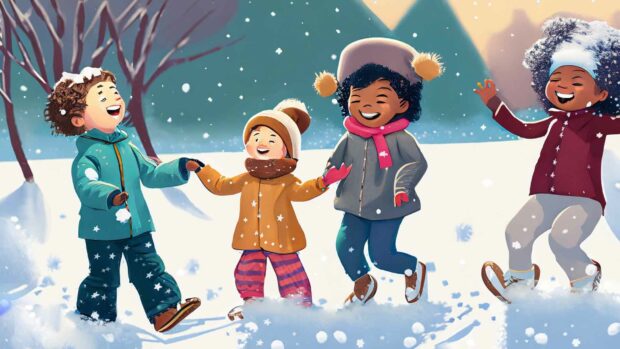
These are just a few of the many winter holidays celebrated around the world. Each holiday has its own unique traditions and customs, but they all share a common theme of celebration and joy. So whether you are celebrating Diwali, Hanukkah, or Kwanzaa, take some time to enjoy the different winter holidays from around the world.
Explore the rich diversity of winter holidays around the world. From Three Kings Day in Spain to Diwali in India, these celebrations offer a unique blend of traditions, rituals, and festivities. #chinesenewyear… Share on X Here's how different cultures celebrate different winter holidays from around the world… #winterholidays #wintertraditions #holidaysaroundtheworld #wintertravel #winterfun Share on XMany winter holidays involve feasting, gift-giving, and spending time with family and friends.
I’m a dog owner that loves poetry, vampires, mountain biking, and cosplay. I’m open to ideas and still trying to figure my SFO life out one blog post at a time. LF ISO SWF GSOH SI DDF.


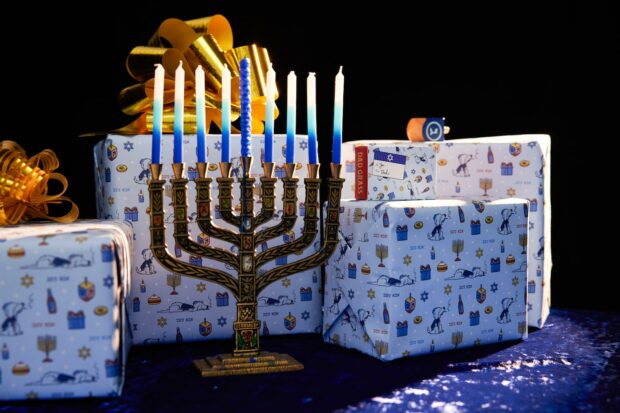
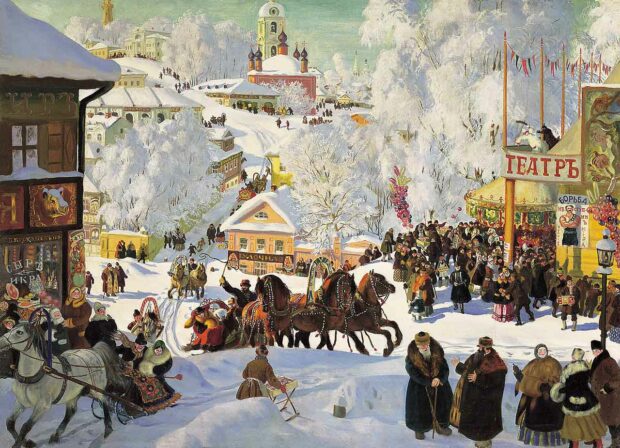
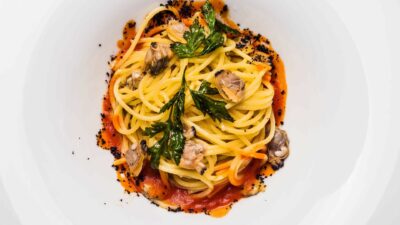











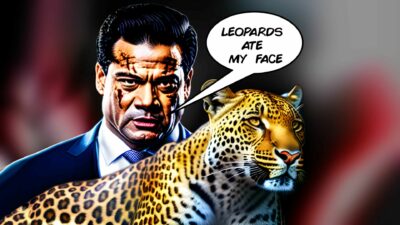



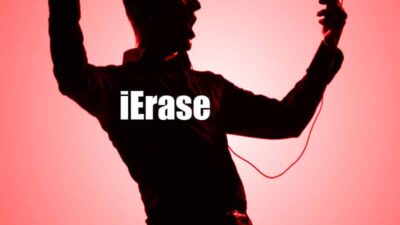





 Santa Claus Announces Christmas Budget Cuts and Restructuring at the North Pole
Santa Claus Announces Christmas Budget Cuts and Restructuring at the North Pole
Leave a Reply
You must be logged in to post a comment.